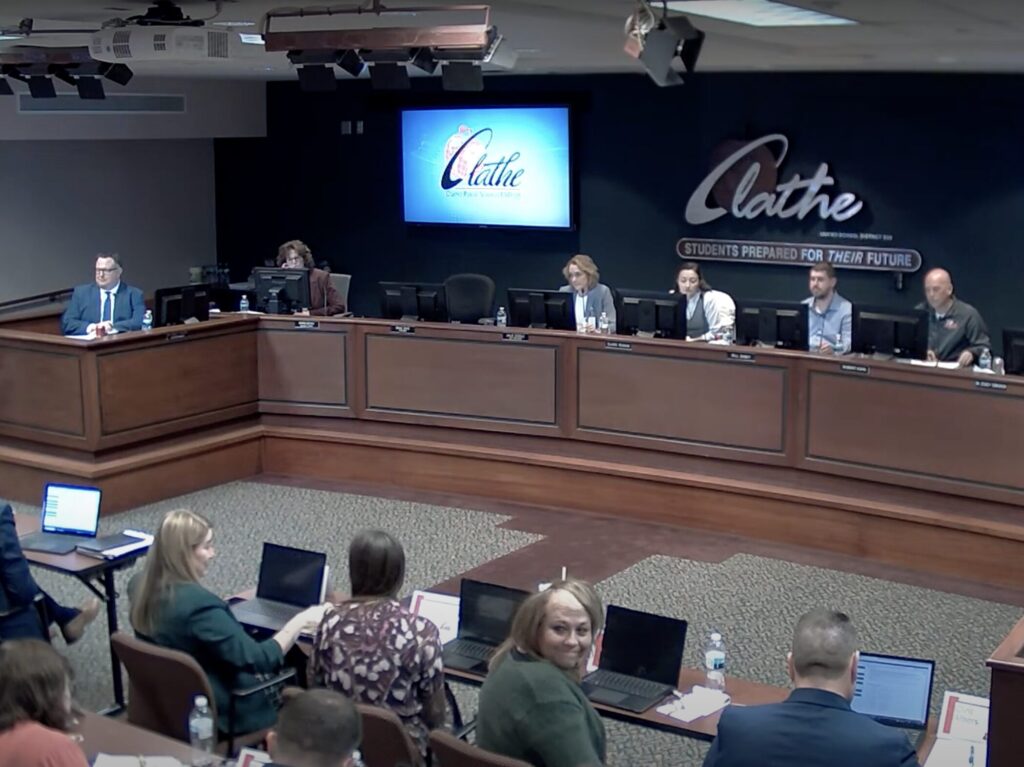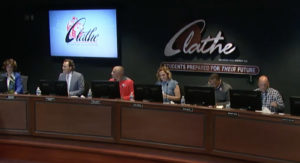Kansas school district surrenders records after nearly a month of obfuscations and denials
(The Sentinel) – After weeks of back and forth reminiscent of a Franz Kafka novel, USD 233 Olathe finally sent the records they continually insisted either did not exist or were exempt from the…

(The Sentinel) – After weeks of back and forth reminiscent of a Franz Kafka novel, USD 233 Olathe finally sent the records they continually insisted either did not exist or were exempt from the Kansas Open Records Act.
On April 15, The Sentinel sent a KORA request asking for “Records sufficient to identify all fees paid to any and all attorneys who performed legal services” on the Jennifer Gilmore viewpoint discrimination case — a case the district ultimately lost and was then ordered to pay Gilmore’s attorney’s fees to the tune of $259,233.
Gilmore had sued in federal district court after she was thrown out of an Olathe Board of Education meeting in 2022 for political comments board members found offensive.
USD 233 Board Clerk Barbra Behm confirmed the district’s own legal fees totaled some $472,327 in addition to paying for Gilmore’s attorney but stated the district was “unable” to provide the records.
“Certain records, if they exist, are not made, maintained, or kept in the possession of the District. Because KORA only applies to ‘public records’ kept by a ‘public agency,’ the District has no records to provide in response to your request,” Behm wrote.
Additionally, Behm tried to suggest that legal fees are “work product” and not subject to KORA.
“Further, to the extent your request seeks communications related to legal services performed in the subject lawsuit, such records are closed under KORA.”
However, this simply isn’t the case. The issue of whether legal fees are subject to open records requirements has already been settled — and not in Olathe’s favor.
In Cypress Media, Inc., v. City of Overland Park, the Kansas Supreme Court found that the “work-product doctrine codified in K.S.A. 1998 Supp. 60-226(b)(4) does not offer a per se exemption to the production of attorney fee statements …”
Olathe attorney denies records exist
When The Sentinel informed Behm of this and asked for the invoices, she involved the district’s general counsel, Christopher Pittman.
Pittman quickly dropped the “work product” claim without comment and simply stated, “Invoices for legal services provided to the District in the subject lawsuit were sent directly by the billing attorneys to Thomas McGee Group, the District’s insurance broker. The District does not possess the requested records.”
After the Sentinel published a story on April 27 noting the district’s obfuscation, Olathe’s Assistant Director of Communications Erin Schulte emailed on May 1, claiming the bills the Sentinel had asked for were discussed in executive session and therefore not subject to KORA.
“Both Olathe Public Schools administration and the Board of Education monitor legal expenses and would review all costs such as this during executive session,” Schulte wrote. “As I am sure you are aware, matters talked about during executive session are unable to be discussed further with outside entities due to the rules surrounding executive sessions and attorney-client privilege.”
The Sentinel responded that: “The documentation of those legal fees is a public record under KORA, regardless of where it is discussed. There is nothing confidential being requested. The District paid a bill; we would like a copy of it.”
Schulte responded two days later on May 5, still claiming the district did not have the records before admitting — in the same email — that the records did, indeed, exist.
“As my colleagues have explained before, we do not have records related to payments by the District to counsel who provided legal services in the Gilmore lawsuit,” Schulte wrote. “Those payments are made by Thomas McGee to the billing attorneys. In turn, the district reimburses Thomas McGee for such payments.
“If you are requesting records related to the District’s payments to Thomas McGee for those services, please confirm. If you are, we can coordinate with our Director of Risk Management, Merle Hastert, to confirm how long it would require him to locate those records and, if there’s a cost associated with those efforts, we will let you know.”
The Sentinel, of course, said “yes,” noting that the language of the original records request would have covered the itemization sent to the board by the McGee Group, which was finally received on May 8.

In other words, the district spent the full 23 days giving the Sentinel either denying the existence of — or trying to avoid handing over — a one-page printout of legal expenses.
USD 233 paid $235,499 to Spencer Fane, Norris, Keplinger, Hicks, & Welder charged$226,166 and a little over $10,000 to two other companies.
There were no secrets to hide. The Sentinel simply requested documentation to confirm the district’s declaration of how much it spent.
Resistance to KORA requests is, unfortunately, not an isolated situation and needs to be addressed by the Legislature.



